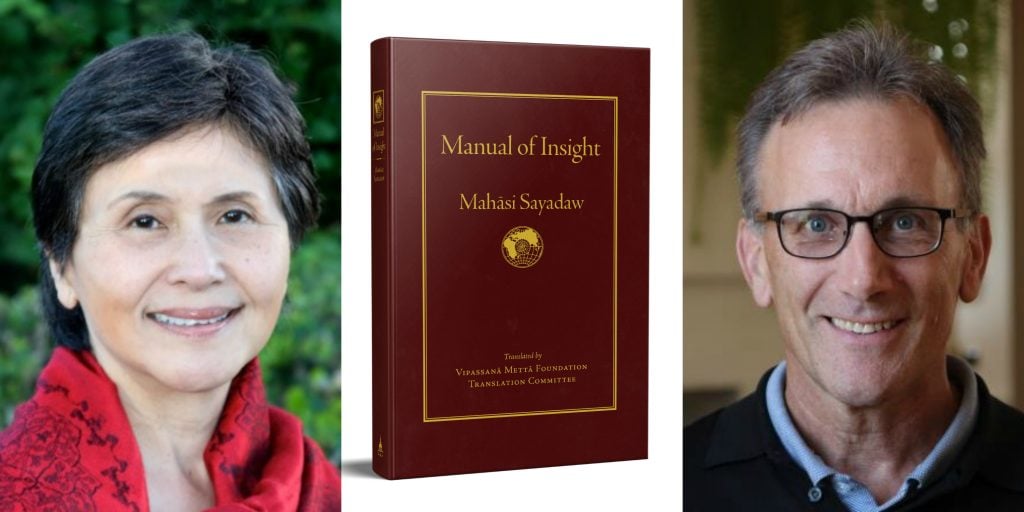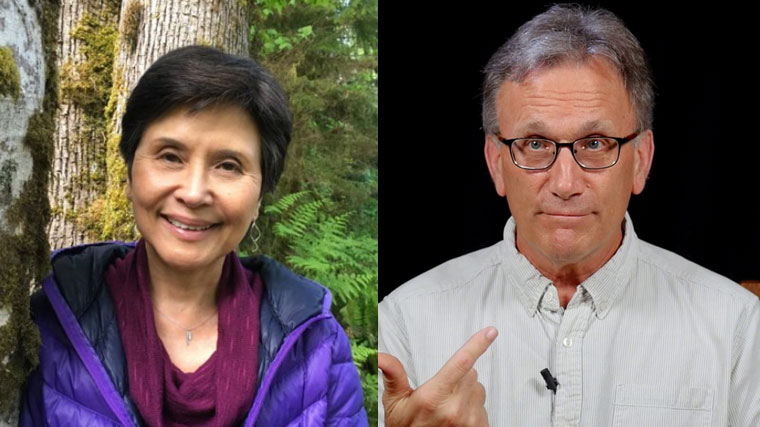Introduction to the Manual of Insight
In this course led by respected insight meditation teachers Steve Armstrong and Kamala Masters, you’ll be introduced to the Manual of Insight by the renowned teacher and meditation master Mahāsi Sayadaw. Through a series of teachings on this foundational text about the practice of mindfulness for developing insight, Steve offers clear guidance in navigating essential topics including mental purification, deepening insights at increasing stages of momentary concentration, and the nature of nibbāna. Kamala and Steve offer guided meditations to bring the text alive in your own practice. Through select readings, short quizzes, and community interactions, you’ll be supported in navigating the Buddha’s liberating Noble Eightfold Path as articulated in this seminal text.
When you enroll, you’ll have unlimited access to the course and can proceed through the eight lessons at your own pace and on your own timeframe. There were four live video conferences that were recorded when the course was live in the fall of 2016 and can now be viewed by any student in this course.
This is a course produced in partnership with the Barre Center for Buddhist Studies.

What You’ll Learn
- The mutual and reciprocal benefits between the three trainings of the Noble Eightfold Path: nonharming restraint, tranquility, and insight.
- To see through the illusions of conditioning.
- Why tranquility, joy, ecstasy, bliss, etc., are not the goal, but just pleasant experiences on the path to awakening.
- How insights into impermanence, unsatisfactoriness, and conditioning are liberating.
- How nibbāna, the end of suffering, is realized.
About this Course

The Manual of Insight, the opus of Mahāsi Sayadaw, a great Buddhist scholar and practitioner of the twentieth century, presents the teachings at the root of the widespread introduction of mindfulness in the West today. Not limited to secular applications, the training offered here aims for nothing less than liberation—freeing the mind from suffering and the causes of suffering. This book shares the Theravada way of insight to realization of all Four Noble Truths, the essential teachings of the Buddha recognized by all traditions.
The guidance for the threefold training of the Noble Eightfold Path includes the mindfulness practice of restraint in speaking and acting so as to not cause harm to self or others; mindfulness of remembering to observe and recognize the present-moment experience and calm and stabilize the obsessing mind; and mindfulness of the unique and universal characteristics of all phenomena, which unfolds as liberating insight that reaches the highest goal of the Buddha’s teaching, realization of the Third Noble Truth, the cessation of suffering. It is this complete training that is at the core of this manual.
The process of insight begins with empirically understanding the body-mind process hidden beneath conventional understandings. The terrain of the path traverses the struggles with obsessive mental habits and opens to the “spiritual goodies,” as Steve Armstrong calls them, of great faith, joy, ecstasy, bliss, and more. Understanding that indulging in these is an obstacle deepens the unfolding of empirical insights into the three universal characteristics of impermanence, unsatisfactoriness, and conditionality, and exposes the conditioning of multiple layers of deluded beliefs. When insight matures to the nonreactive abiding of equanimity, one’s ability to access the unconditioned, nibbāna, becomes possible.
The path is clear for those who wish to walk it. In this course, we will study the map and explore the journey through the practice of insight.
Lessons
Lesson 1: Introduction to the Manual of Insight
This lesson covers:
- Introduction to Mahāsi Sayadaw and the Manual of Insight
- 16 preparatory practices for insight meditation.
- Purification of conduct sufficient for insight.
This lesson covers:
- Introduction to Mahāsi Sayadaw and the Manual of Insight
- 16 preparatory practices for insight meditation.
- Purification of conduct sufficient for insight.
Lesson 2: Mental Purification
This lesson covers:
- Mental purification: access, absorption, momentary concentration
- Hindrances and causes of liberation.
- Basic, intermediate and advanced insight through momentary concentration.
This lesson covers:
- Mental purification: access, absorption, momentary concentration
- Hindrances and causes of liberation.
- Basic, intermediate and advanced insight through momentary concentration.
Lesson 3: Conventional and Empirical Realities
This lesson covers:
- Conventional realities: conceptual illusions, hearsay, tradition, scripture, logic, reason, and opinion.
- Observed or experienced realities of mind, matter, mental factors and nibbāna.
- Empirical and inferential insight.
This lesson covers:
- Conventional realities: conceptual illusions, hearsay, tradition, scripture, logic, reason, and opinion.
- Observed or experienced realities of mind, matter, mental factors and nibbāna.
- Empirical and inferential insight.
Lesson 4: Mindfulness
This lesson covers:
- Four aspects of all phenomena.
- Objects of awareness: material elements, feelings, mental states, attitudes of mind, cognitive processes, nibbāna.
- Insight into the unique, conditioned and universal natures of phenomena.
This lesson covers:
- Four aspects of all phenomena.
- Objects of awareness: material elements, feelings, mental states, attitudes of mind, cognitive processes, nibbāna.
- Insight into the unique, conditioned and universal natures of phenomena.
Lesson 5: Insight and Spiritual Goodies
This lesson covers:
- Arising and passing away of phenomena: the first of the “well-developed insights.”
- Conceit, craving and wrong views mistake ten experiences of pseudo-nibbāna as “IT!”
- Letting go of ecstasy, bliss and beyond.
This lesson covers:
- Arising and passing away of phenomena: the first of the “well-developed insights.”
- Conceit, craving and wrong views mistake ten experiences of pseudo-nibbāna as “IT!”
- Letting go of ecstasy, bliss and beyond.
Lesson 6: Purification of Understanding
This lesson covers:
- “Rolling-up-the-mat” stages of practice in the process of insight.
- Knowledge of dukkha: investigating the first noble truth of suffering
- Emptiness of suññata: dissolution, fear, danger and disenchantment/disillusionment.
- Re-affirmation of the way forward.
This lesson covers:
- “Rolling-up-the-mat” stages of practice in the process of insight.
- Knowledge of dukkha: investigating the first noble truth of suffering
- Emptiness of suññata: dissolution, fear, danger and disenchantment/disillusionment.
- Re-affirmation of the way forward.
Lesson 7: Equanimity
This lesson covers:
- Contemplation of impermanence: abandoning latent defilements.
- The characteristics of the neutral mind: balanced faculties, factors of awakening, and vicissitudes.
- Insight equanimity and the six plasticity factors that exhibit a flexibility of mind.
This lesson covers:
- Contemplation of impermanence: abandoning latent defilements.
- The characteristics of the neutral mind: balanced faculties, factors of awakening, and vicissitudes.
- Insight equanimity and the six plasticity factors that exhibit a flexibility of mind.
Lesson 8: Realizing Nibbana
This lesson covers:
- The nature of nibbāna
- The purification of first stage of enlightenment
- The further paths.
This lesson covers:
- The nature of nibbāna
- The purification of first stage of enlightenment
- The further paths.
About the Teacher
 Kamala Masters began practicing meditation in the mid-seventies, attending retreats in the Theravada tradition. In 1977 she met Anagarika Munindra, her first teacher, who taught her the value of being mindful in everyday life. In 1985, she began to practice vipassana and metta meditations intensively with Sayadaw U Pandita, with whom she temporarily ordained as a Buddhist nun in 2001 and 2003. In 2005, she began practicing cittanupassana, contemplation of mind, with Sayadaw U Tejaniya. She integrates this teaching with what she has learned from her other respected teachers.
Since the early nineties, Kamala has been teaching in the United States and abroad, and is a guiding teacher and member of the board of directors at the Insight Meditation Society. In 1995 she co-founded Vipassana Metta Foundation with Steve Armstrong, developing the Maui Dhamma Sanctuary for self-reliant students to practice. She served as an editor on the Vipassana Metta Foundation Translation Committee for Mahasi Sayadaw’s Manual of Insight, published by Wisdom Publications in 2016.
Kamala strives for extended periods of self-retreat each year. She is grateful for the opportunity to serve and to grow in the Dhamma.
Steven Armstrong has studied the Dhamma and practiced insight meditation since 1975. He served for many years at the Insight Meditation Society in Massachusetts as executive director, board member, and senior teacher of the annual three month retreat. As a monk in Burma for five years, under the guidance of Sayadaw U Pandita, he undertook intensive, silent practice of insight and lovingkindness meditations, and in Australia, he studied the Buddhist psychology (abhidhamma) with Sayadaw U Zagara. He continues his practice under the guidance of Sayadaw U Tejaniya at the Shwe Oo Min Meditation Center in Rangoon. Steve, along with Kamala Masters, is a co-founding teacher of the Vipassana Metta Foundation’s Dharma sanctuary on Maui. He has been leading meditation retreats internationally since 1990, presenting the core teachings of the Buddha and offering a variety of Buddhist mindfulness practices, encouraging cultivation of insightful awareness, and liberating understanding in all life activities. He encourages spiritual development of an unshakeable sense of well-being. On Maui he plants trees for a Dhamma sanctuary and directs the Burma Schools Project building schools and clinics in Burma and supporting monastics and nuns.
Kamala Masters began practicing meditation in the mid-seventies, attending retreats in the Theravada tradition. In 1977 she met Anagarika Munindra, her first teacher, who taught her the value of being mindful in everyday life. In 1985, she began to practice vipassana and metta meditations intensively with Sayadaw U Pandita, with whom she temporarily ordained as a Buddhist nun in 2001 and 2003. In 2005, she began practicing cittanupassana, contemplation of mind, with Sayadaw U Tejaniya. She integrates this teaching with what she has learned from her other respected teachers.
Since the early nineties, Kamala has been teaching in the United States and abroad, and is a guiding teacher and member of the board of directors at the Insight Meditation Society. In 1995 she co-founded Vipassana Metta Foundation with Steve Armstrong, developing the Maui Dhamma Sanctuary for self-reliant students to practice. She served as an editor on the Vipassana Metta Foundation Translation Committee for Mahasi Sayadaw’s Manual of Insight, published by Wisdom Publications in 2016.
Kamala strives for extended periods of self-retreat each year. She is grateful for the opportunity to serve and to grow in the Dhamma.
Steven Armstrong has studied the Dhamma and practiced insight meditation since 1975. He served for many years at the Insight Meditation Society in Massachusetts as executive director, board member, and senior teacher of the annual three month retreat. As a monk in Burma for five years, under the guidance of Sayadaw U Pandita, he undertook intensive, silent practice of insight and lovingkindness meditations, and in Australia, he studied the Buddhist psychology (abhidhamma) with Sayadaw U Zagara. He continues his practice under the guidance of Sayadaw U Tejaniya at the Shwe Oo Min Meditation Center in Rangoon. Steve, along with Kamala Masters, is a co-founding teacher of the Vipassana Metta Foundation’s Dharma sanctuary on Maui. He has been leading meditation retreats internationally since 1990, presenting the core teachings of the Buddha and offering a variety of Buddhist mindfulness practices, encouraging cultivation of insightful awareness, and liberating understanding in all life activities. He encourages spiritual development of an unshakeable sense of well-being. On Maui he plants trees for a Dhamma sanctuary and directs the Burma Schools Project building schools and clinics in Burma and supporting monastics and nuns.$247.00Enroll
